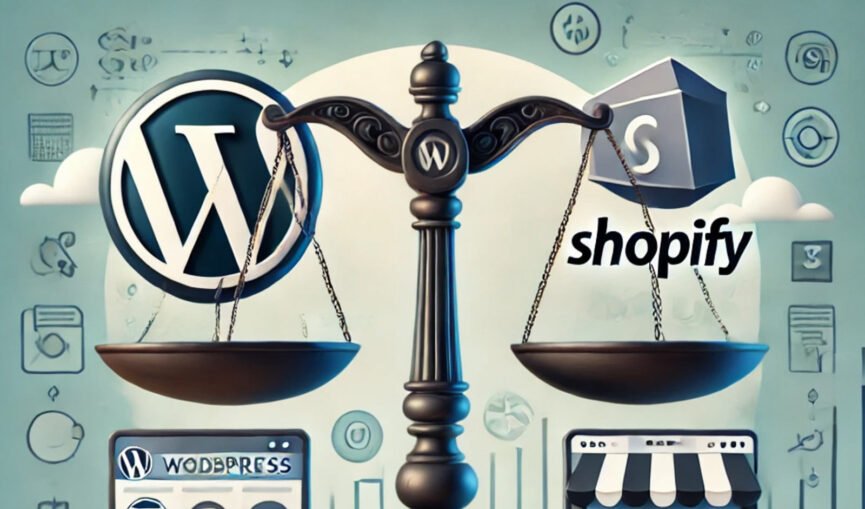When it comes to building an eCommerce store, two of the most popular platforms are WordPress (WooCommerce) and Shopify. Both platforms offer powerful tools to create and manage an online store, but they cater to different needs, budgets, and technical skills.
If you’re wondering whether WordPress or Shopify is the right choice for your business, this guide will compare their features, costs, customization options, SEO capabilities, and long-term scalability. By the end, you’ll know which platform suits your business best.
Overview of WordPress (WooCommerce) and Shopify
What is WordPress + WooCommerce?
- WordPress is a content management system (CMS) that powers over 40% of websites worldwide.
- WooCommerce is a free plugin that turns any WordPress site into a fully functional eCommerce store.
- WordPress + WooCommerce is self-hosted, meaning you have full control over your store’s hosting, design, and functionality.
What is Shopify?
- Shopify is a hosted eCommerce platform, meaning it provides everything you need in one package—hosting, security, and built-in features.
- It’s a subscription-based service that simplifies the process of launching and managing an online store.
- Shopify is designed for ease of use, making it ideal for beginners and small businesses that want a hassle-free setup.
1. Ease of Use
- Shopify: Best for beginners. Shopify offers a drag-and-drop interface, making it easy to set up and manage a store without coding.
- WordPress + WooCommerce: More flexible but has a steeper learning curve. You’ll need to install and manage hosting, themes, and plugins, but you gain full control over your store.
Winner: Shopify for beginners, WooCommerce for those who want full control.
2. Customization & Flexibility
- Shopify: Offers a variety of pre-designed themes and an app store for additional features, but customization is limited to Shopify’s ecosystem.
- WordPress + WooCommerce: Unlimited customization. You can modify every aspect of your store using custom code, plugins, and third-party integrations.
Winner: WordPress + WooCommerce for maximum flexibility.
3. Costs & Pricing
- Shopify: Starts at $39/month + transaction fees if you don’t use Shopify Payments. Additional costs for premium themes and apps.
- WordPress + WooCommerce: WooCommerce itself is free, but you’ll need to pay for hosting ($5–$30/month), domain, themes, and plugins. No transaction fees if using third-party payment gateways.
Winner: WooCommerce is generally more cost-effective in the long run, especially for larger stores.
4. SEO & Performance
- Shopify: Has built-in SEO features, but customization is limited. Shopify stores rely on Shopify’s server performance.
- WordPress + WooCommerce: Superior SEO capabilities. You have full control over technical SEO, speed optimization, and site structure.
Winner: WooCommerce for better SEO control and site speed optimization.
5. Payment Options & Fees
- Shopify: Supports multiple payment gateways, but charges additional fees (0.5%–2%) if you don’t use Shopify Payments.
- WooCommerce: No extra transaction fees, and it supports PayPal, Stripe, and local payment gateways.
Winner: WooCommerce for lower costs and more payment flexibility.
6. Security & Maintenance
- Shopify: Fully hosted, meaning Shopify handles security, backups, and updates.
- WordPress + WooCommerce: You are responsible for security and maintenance (regular updates, backups, SSL certificates).
Winner: Shopify for ease, WooCommerce for control.
7. Scalability & Growth
- Shopify: Scales well for small to mid-sized businesses, but transaction fees and app costs add up as you grow.
- WordPress + WooCommerce: Highly scalable for large businesses, allowing for full customization and control over growth strategies.
Winner: WooCommerce for long-term scalability.
8. Support & Community
- Shopify: 24/7 customer support included in all plans.
- WordPress + WooCommerce: No official support, but a huge global community, forums, and expert developers.
Winner: Shopify for direct support, WooCommerce for community-driven solutions.
Conclusion: Which Platform is Right for You?
| Feature | Shopify | WordPress + WooCommerce |
|---|---|---|
| Ease of Use | ✅ Best for beginners | ❌ Requires setup & maintenance |
| Customization | ❌ Limited | ✅ Unlimited |
| Costs | ❌ Monthly fees + transaction fees | ✅ More cost-effective long-term |
| SEO | ❌ Basic | ✅ Advanced control |
| Payment Fees | ❌ Extra fees if not using Shopify Payments | ✅ No extra fees |
| Security | ✅ Managed by Shopify | ❌ User-managed |
| Scalability | ✅ Good for small to medium stores | ✅ Best for large businesses |
| Support | ✅ 24/7 support | ❌ Community-driven |
Choose Shopify if:
- You’re a beginner and need a simple, plug-and-play solution.
- You don’t want to deal with hosting, security, or maintenance.
- You’re okay with ongoing monthly fees and limited customization.
Choose WordPress + WooCommerce if:
- You want full control over design, SEO, and features.
- You’re looking for a cost-effective solution in the long run.
- You plan to scale your store with advanced customization and growth strategies.
If you’re serious about growing a unique and fully customized eCommerce business, WordPress + WooCommerce is the best choice. Need help setting up your WooCommerce store? Contact us today to build a high-performance online shop tailored to your brand!
Get Started with Your WooCommerce Store Today!

